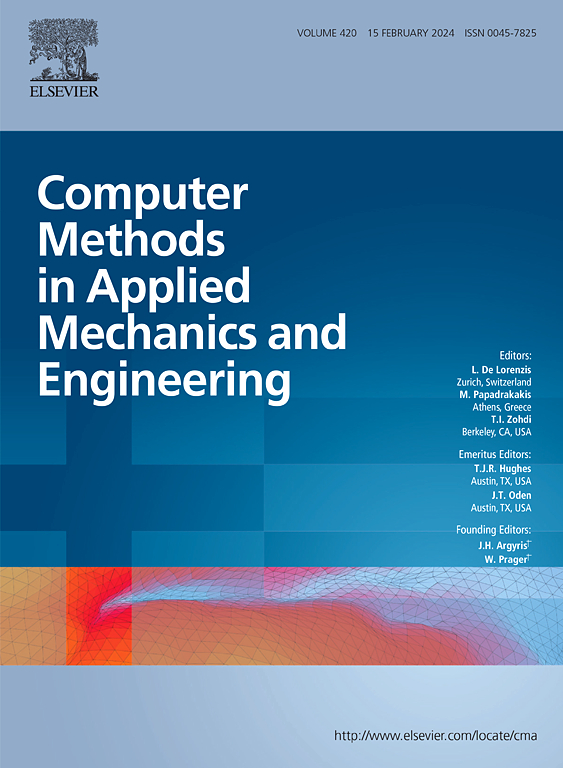AK-UL: An active learning kriging method based on uniform sampling and local refinement for efficient reliability analysis with small failure probability
IF 6.9
1区 工程技术
Q1 ENGINEERING, MULTIDISCIPLINARY
Computer Methods in Applied Mechanics and Engineering
Pub Date : 2025-06-20
DOI:10.1016/j.cma.2025.118163
引用次数: 0
Abstract
This paper introduces a novel active learning kriging-based reliability analysis method that uses uniform sampling and local refinement, termed AK-UL, with a focus on problems involving small failure probabilities. Traditional methods, such as AK-MCS, struggle to identify failure regions efficiently because of the irregular distribution of candidate points and the high computational cost of generating many samples. The AK-UL method overcomes these challenges by introducing a uniform sampling employed in active learning, which is separated from the random samples used for failure probability calculation. This separation ensures a more uniform distribution of training data around the limit state function, thereby enhancing the efficiency of failure region identification. Additionally, a small uniform sample set dramatically reduces the computational cost of the evaluation by the surrogate model in a small failure probability problem. Additionally, a local search process is incorporated to refine candidate points, guiding them closer to the limit state function along the gradient direction of the performance function and overcoming the sparse problem of the small uniform set that is not able to infill the design space. Numerical examples and an engineering case study demonstrate that AK-UL reduces the computational time and improves the accuracy compared with traditional methods. The results highlight that AK-UL is particularly effective for complex reliability analysis problems with small failure probabilities, offering significant computational cost savings while maintaining high accuracy.
AK-UL:一种基于均匀采样和局部细化的主动学习kriging方法,用于小失效概率下的高效可靠性分析
本文介绍了一种新颖的基于主动学习克里格的可靠性分析方法,该方法采用均匀采样和局部细化,称为AK-UL,主要研究小失效概率问题。由于候选点的不规则分布和生成大量样本的计算成本高,传统方法(如AK-MCS)难以有效识别故障区域。AK-UL方法通过在主动学习中引入统一采样来克服这些挑战,该方法与用于故障概率计算的随机样本相分离。这种分离保证了训练数据在极限状态函数周围的分布更加均匀,从而提高了故障区域识别的效率。此外,小的均匀样本集大大减少了代理模型在小失效概率问题中评估的计算成本。此外,结合局部搜索过程对候选点进行细化,使候选点沿着性能函数的梯度方向更接近极限状态函数,克服了小均匀集不能填充设计空间的稀疏问题。数值算例和工程实例研究表明,与传统方法相比,AK-UL减少了计算时间,提高了精度。结果表明,AK-UL对于具有小故障概率的复杂可靠性分析问题特别有效,在保持高精度的同时节省了大量的计算成本。
本文章由计算机程序翻译,如有差异,请以英文原文为准。
求助全文
约1分钟内获得全文
求助全文
来源期刊
CiteScore
12.70
自引率
15.30%
发文量
719
审稿时长
44 days
期刊介绍:
Computer Methods in Applied Mechanics and Engineering stands as a cornerstone in the realm of computational science and engineering. With a history spanning over five decades, the journal has been a key platform for disseminating papers on advanced mathematical modeling and numerical solutions. Interdisciplinary in nature, these contributions encompass mechanics, mathematics, computer science, and various scientific disciplines. The journal welcomes a broad range of computational methods addressing the simulation, analysis, and design of complex physical problems, making it a vital resource for researchers in the field.

 求助内容:
求助内容: 应助结果提醒方式:
应助结果提醒方式:


